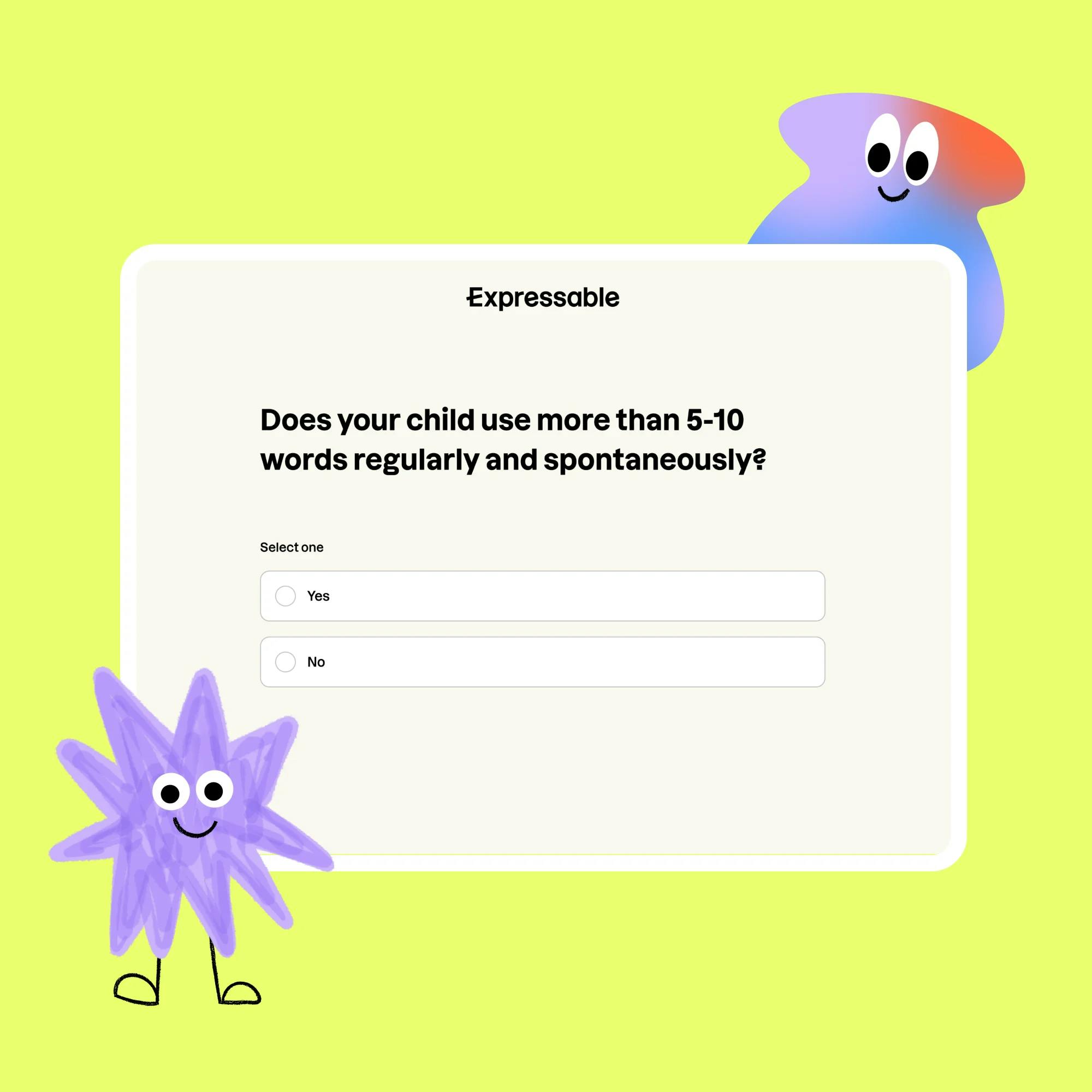From first grade through fifth grade, there’s a lot going on with children’s overall development. They’re learning the ins and outs of school, meeting new people, and growing into their own individual person. Communication development is also a huge area of growth in elementary school, and it’s something parents and caregivers should be monitoring.
This article covers the milestones to look for in your child’s communication development from ages 6 to 10. We discuss how those skills relate to academics, and signs that your child may have a speech or language disorder. You’ll also learn what to do if you notice your grade-school child struggling with speech and language. It’s never too late for children to benefit from speech therapy.
Speech milestones for elementary school-aged children
The ability to make clear and distinct sounds when speaking is known as articulation. It refers to the motoric ability to produce sounds using our lips, tongue, teeth, palate, and the coordination of our breath.
When children are very young, they will likely pronounce some consonants incorrectly. That can be a normal part of development. However, these errors shouldn’t stick around forever.
By the time a child is 5 years old, they should be able to say all speech sounds correctly, without any speech errors. This includes pronouncing trickier sounds like /l/, /s/, /r/, and “TH.”
Clear speech is important for a few reasons. Kids ages 6 to 10 are interacting with peers as well as teachers, coaches, and other adults. The ability to communicate clearly helps children grow their confidence and self-esteem. If people are always asking a child to repeat themselves, the child may shy away from speaking and engaging with others. First grade through fifth grade are formative years, and strong communication skills make a big difference.
If people are always asking a child to repeat themselves, the child may shy away from engaging with others.
Clear speech is also a safety issue. As caregivers, we never want our children to be in an emergency situation. But if they are, their speech should be clear enough to explain what happened and answer important questions.
If your first-grader is still having a hard time pronouncing words clearly, make an appointment with a speech-language pathologist, also known as a speech therapist. The speech therapist can evaluate your child and recommend treatment if it's needed. The earlier you reach out, the better. So don’t wait!


Language milestones for elementary school-aged children
While speech refers to the way we say sounds and words, language refers to how we understand what’s said to us and use words to get our message across.
Here are some key language milestones that children in elementary school typically reach. If your child struggles in any of these areas, that might be a sign of a speech or language delay.
Using correct grammar
Typically, school-aged children are using correct grammar most of the time. For example, you should be hearing correct use of plurals. That includes words with the plural “s,” like “shoes” and “boys,” as well as irregular plurals, such as “leaves” or “men.”
School-aged children typically use correct grammar most of the time.
Your child should also be able to use correct verb tenses. No matter if a child is talking about something in the past, present, or future, their verb usage should reflect the timeframe they’re discussing. Let’s use the word drink for an example. When referring to the past, you would say, I drank the milk. Present tense: I am drinking the milk. Or when referring to the future: I will drink the milk.
Alex's story
Just a few months of therapy led to big gains in speech sounds and conversation. Now, he can better express himself with teachers and friends.
 Read Alex's story
Read Alex's storyTelling stories
Children who are 6 to 10 years old can typically tell stories that make sense, are easy to follow, and are organized clearly. If they’re telling you what happened at the baseball game or how they created their art project, the story should be in order and easy to follow. If their story skips around or veers off into other topics, this can be a sign of an expressive language delay.
Children ages 6 to 10 years old can typically tell stories that make sense and are easy to follow.
Using and understanding vocabulary
Most children in first grade through fifth grade can use vocabulary words correctly. This means that when they use bigger words or words that are new to them, they are quickly able to integrate those words into their everyday speech. Difficulty learning new vocabulary words or using words correctly can be a sign of a receptive/expressive language delay.


Using figurative speech
Figurative speech is another area of language development that should be present for elementary-aged kids. For example, they should be able to understand and use similes, or comparing items using the concepts of like or as. It could be a phrase like, “I’m as cold as ice” or “I’m as hungry as a horse.”
Kids ages 6 to 10 can typically use and understand metaphors as well. This is when two things are compared without using like or as. For example, “The classroom is a zoo on the last day of school!” or “The soccer field was a lake after all that rain!”
Following directions
By the time they reach first grade, kids can typically follow multistep directions. This means that whether they’re at home or at school, they can easily do what’s asked of them, even if several steps are included. Here’s an example: “Hang up your backpack, take a seat, and get out your math book.”


Social skills for children in elementary school
Children in first grade through fifth grade typically demonstrate a variety of social skills. Let’s review some of the important ones. If your child has a hard time with any of these milestones, they may need support with social communication. (Note that these are social skills expected of neurotypical children. In children who are neurodivergent, such as those with autism or ADHD, social communication may look different. Speech therapy can help neurodivergent individuals communicate in an authentic, effective way that feels right for them.)
Typically, kids can easily start and maintain conversations with peers and teachers. If they need help with something, they can easily ask their teacher. If they want to play with a friend during recess or introduce themselves to a new student, they can do so. Younger kids may need some practice, as these are new situations for them. But neurotypical children should be able to grasp these skills easily.


As kids develop conversational skills, they learn how to:
Ask questions and make comments to keep a conversation going
Stay on topic as they talk
Bring up topics that are interesting to the other person, not just themselves
These are all signs of social language development for kids in elementary school.
A fun thing to watch for in your child’s development is their ability to tell and enjoy jokes. Using and understanding humor is a sign of higher level language skills. It shows that kids understand language, vocabulary, and social interactions enough to get a joke or make a funny statement. This helps them build connections with others.
Similarly, the ability to use and understand sarcasm is a social language skill. Typically, as kids progress through grade school, they can understand when sarcasm is being used and not take sarcastic comments literally. Difficulty with this could be a sign of social language issues.


How speech and language delays can affect academics
If your 6- to 10-year-old is struggling with school, they could have underlying speech and language issues. When a grade-school student has a hard time understanding vocabulary words, or processing spoken or written language, this can affect their reading comprehension. Everyday classroom tasks and assignments may be hard for them.
Reading disorders can go hand-in-hand with speech issues. If a child struggles to understand which sounds are tied to what letters, this can create problems with reading and writing.


What if your elementary-school child has a hard time making and keeping friends, or communicating with their peers? This could be a sign of a social language delay. Problems with social communication can have a big impact on your child’s self-esteem, confidence, and overall experience at school.
Check in with your child and their teachers to learn more about how they’re doing with school. Speech therapy can help with many of these issues, from reading disabilities to social communication problems.


It’s never too late to start speech therapy
It’s true that children tend to make progress quickly when they start speech therapy at a young age. The faster a child’s difficulties can be identified, the faster they can get help and begin communicating more clearly. However, if you think your school-aged child may need speech services and you’re wondering if it’s too late–it’s not! Many school-aged children and teenagers benefit from speech therapy. Is early intervention ideal? Yes, absolutely. But everyone deserves the chance to become a clear, confident communicator. Speech therapy can be life-changing, and beginning later is better than never receiving it at all.


If you’d like to have your child evaluated by a speech therapist, you can start the process in a few different ways. You can talk to your child’s teacher to find out if there is a speech therapist at your school. They may be able to start the evaluation process. You can also ask your child’s pediatrician for recommendations for speech therapists. It’s important to find the right fit for your child, so consider a few options to find the best speech therapist for your child. Once you find the right one, they will walk you through the steps to beginning speech therapy. If you think your child may need help, don’t wait to get started!
How Expressable Can Help
Concerned your child isn't reaching age-expected milestones? Looking for communication support from a professional? Expressable is a national online speech therapy practice serving children and adults. We treat all major areas of communication and feeding, offer flexible hours including evenings and weekends, and accept most major health insurance plans. We’re proud to have earned more than 3,000 5-star reviews from our clients (4.9/5 average).
Our therapy model is centered on parent and caregiver involvement. Research proves that empowering caregivers to participate in their loved one’s therapy leads to better outcomes. That’s why we combine live, 1-on-1 speech therapy with personalized education and home practice activities for faster progress.
Communication is more than words. It’s how we share how we feel and show who we are. We’re here to help you or your child do just that.

 Abby Barnes, M.S., CCC-SLP
Abby Barnes, M.S., CCC-SLP









